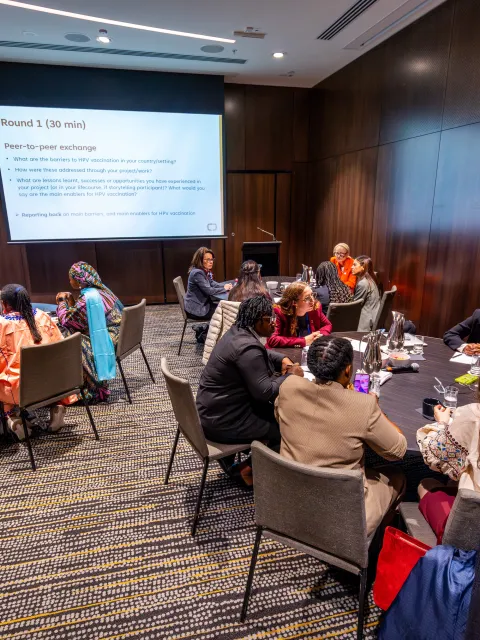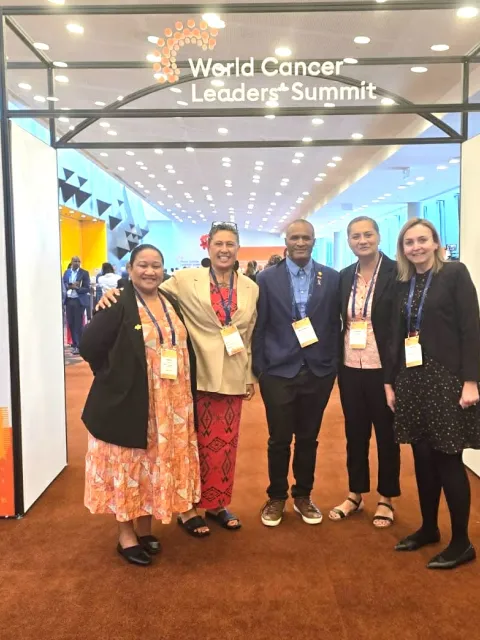Addressing gender barriers in cancer control
Ahead of International Women's Day on 8 March, UICC speaks with the co-chairs of The Lancet Commission on Women, Power and Cancer about the need for a gender-specific approach in research, data collection and policy making to mitigate the wide-ranging impact that cancer has on women globally.

The differences in how cancer affects women to men is wide-ranging, from the biological and medical effects of the disease and treatments to psychosocial concerns, financial well-being, exposure to cancer risk factors and missed opportunities for cancer prevention.
HIGHLIGHTS
- Two-thirds of the three million new cases among adults under the age of 50 in 2020 occurred in women.
- Women face a range of challenges when it comes to cancer prevention, detection, and treatment, from biological and medical effects to psychosocial concerns, financial well-being, exposure to risk factors and discrimination.
- The Lancet Commission on Women and Cancer is set to release a report later this year that aims to highlight the wide-range impacts of gender on cancer, emphasise the need for a gender-based approach to cancer research and policy development, and recommend policy changes to improve access to care and prevention services for women.
While the overall number of new cancer cases and cancer-related deaths in 2020 remained somewhat higher for men than for women globally, two-thirds of the three million new cases among adults under the age of 50 occurred in women.
This has a significant impact not only on the lives and livelihoods of women, but also their families, children and societies at large. A study by the International Agency for Research on Cancer has shown that over one million children lost their mothers to cancer in 2020.
The differences in how cancer affects women compared to men are wide-ranging, from the biological and medical effects of the disease and treatments to psychosocial concerns, financial well-being, exposure to cancer risk factors and missed opportunities for cancer prevention.
"Take breastfeeding, which is one of many important actions for breast cancer prevention. But in many settings and for many women there are a lot of problems surrounding breastfeeding in terms of having the time and opportunity, the appropriate structures, environments and legislation as well as how people look at women (at workplace) taking working time to breastfeed. This example alone shows the complexity of the women and cancer issue and shows a completely different perspective."
– Dr Isabelle Soerjomataram, Deputy Branch Head, Cancer Surveillance Branch at IARC; co-Chair of The Lancet Commission on Women and Cancer.
The Lancet Commission on Women and Cancer was set up to examine these numerous challenges where social inequality, cancer risk and outcomes as well as power and the status of women in society intersect, with a report that is due out later this year. The Commission consists of a multidisciplinary and diverse team from around the globe, with expertise in gender studies, human rights, law, economics, sociology, as well as cancer epidemiology, prevention and treatment.
The Commission is co-chaired by Dr Ophira Ginsburg, Senior Advisor for Clinical Research at the US National Cancer Institute-Center for Global Health; Dr Isabelle Soerjomataram, Deputy Branch Head, Cancer Surveillance Branch at IARC; and Dr Verna Vanderpuye, National Center for Radiotherapy, Oncology and Nuclear Medicine at the Korlebu Teaching Hospital in Accra, Ghana.
"There is a complex interplay of factors that prevent women more than men from accessing care and prevention services. In many regions of the world, for instance, it is not safe for a woman to travel alone. Even the simple thing of going to a clinic or to exercise. The lack of safety from sexual violence, which is a very real threat in many places of the world, impedes women from also getting enough physical activity in addition to having trouble accessing care.”
– Dr Ophira Ginsburg, Senior Advisor for Clinical Research at the US National Cancer Institute-Center for Global Health; co-Chair of The Lancet Commission on Women and Cancer.
Many women do not know the signs and symptoms of cancer, and may not seek medical attention until the disease has progressed to an advanced stage. They also face barriers due to gender norms and discrimination, lack of patient agency and geographical location, which prevent them from accessing services even when they are available.
In many cultures, there is a stigma surrounding cancer and women may feel ashamed or embarrassed to seek help, or may not do so out of fear of a cancer diagnosis and the impact it may have on their lives and those around them, including a fear of the potential consequences on how they are perceived as women. In other cultures, women may not have the freedom, the autonomy or ability to make their own healthcare decisions. Sometimes it may not be a question of rights, but women may be discouraged from seeking medical advice, for instance when the cultural norm favours what is best for the family, with women low on the priority list compared with husbands.
"A women’s educational status doesn’t matter – they have to practically toe the line. Unfortunately, it's even worse when they are not financially independent, then they have to decide what to pay for and what they think is a waste of money. Or there are some procedures, such as a mastectomy – that they don't undergo because they would no longer be considered a woman and want to hold on to their marriages. Every single day that happens, irrespective of a woman’s educational background.”
– Dr Verna Vanderpuye, National Center for Radiotherapy, Oncology and Nuclear Medicine at the Korlebu Teaching Hospital in Accra, Ghana; co-Chair of The Lancet Commission on Women and Cancer.
When speaking about women's cancers, the discussion often revolves around breast and cervical cancer. Breast cancer is the most commonly diagnosed cancer worldwide and the one for women that is most likely to result in death, while cervical cancer is the fourth most common. Both can be treated successfully when diagnosed early and cervical cancer can be largely prevented through vaccination, yet these cancers continue to exact a heavy toll on women in low- and middle-income countries (LMICs) – 90% of all cervical cancer deaths occur in LMICs – due to a lack of prevention, early detection and treatment services.
Dr Isabelle Soerjomataram warns, however, that it is important to widen the discussion on women's cancers, as women are also particularly affected by lung and colorectal cancers, as well as ovarian cancer.
Indeed, in North America and many European countries, breast cancer mortality has declined while deaths due to lung cancer have increased, even surpassing those due to breast cancer in countries such as the US. The number of cases due to colorectal cancer and related deaths are also increasing in higher income countries.
Dr Soerjomataram and her colleagues highlight the powerful commercial interests of companies that sell carcinogenic and often addictive products. These undermine cancer prevention by increasing the exposure of individuals to modifiable risk factors such as smoking, tobacco consumption and unhealthy diet, which that are driving the rise not only in lung and colorectal cancers but also breast cancer, both in high- and lower-income countries.
“These companies often specifically target women with their unhealthy products,” says Dr Soerjomataram. “This is something we're really trying to address in The Lancet Commission – the ways in which the upstream determinants of health are also gendered. There are some legal instruments already out there, such as the Framework Convention on Tobacco Control, and occupational legislation. Countries need to work with community groups and fully implement these instruments to fight back against these commercial interests that undermine public health."
Shisha or hookah smoking is a big problem in many parts of Africa and elsewhere, says Dr Vanderpuye, especially among youth; yet it is often not perceived as a health risk or not one as significant as smoking combustible tobacco. “And then there is alcohol, often marketed as a multivitamin or a tonic. It’s a big, big issue,” she adds.
The report by The Lancet Commission will be wide-ranging, showing the complex interplay of factors and encompassing all the ways in which women can be marginalised, as well as the overlapping domains of discrimination, notably age and ethnicity. “A woman of color or an indigenous woman, even in Canada or Australia, tend to have much lower cancer screening rates and worse cancer outcomes in terms of survival and quality of life. And for the most part, they are worse than the men in those same cultural groups as well," says Dr Ginsburg.
There will also be a section on cancer economics where the Commission takes a “gender lens” to look at the financial dynamics underlying women’s lower access to care. “Are we really appropriately capturing the value that women provide in the workforce?" asks Dr Ginsburg. "There's a great deal of care that happens in the home, unpaid caregiving, and this is done predominantly by women – but the impact that cancer has on country productivity overall, in the context of women’s health, hasn't really been looked at in any detail globally. We need to reassess how we value women’s contributions to society."
The report by The Lancet Commission on Women and Cancer ultimately intends to emphasise the need to take a gender-based approach to all aspects of the issue. This starts with data collection and what is known about women’s cancers, and continues with greater inclusion of women in academia, research and leadership positions, more clinical trials designed around the particular needs of women, and careful consideration of cross-cutting issues in policy development such as age, race, ethnicity, geographical location and socioeconomic background.
The Commission will then propose a set of informed recommendations for policymakers, and other stakeholders, which they will share not only in the report but also through events, patient groups, professional societies and other effective channels.
“It's about women who are least likely to be able to benefit from the improvements in cancer. Cancer research has led to huge mortality reductions in countries such as Canada and the US but not everyone has been able to benefit from all of this research."
– Dr Ophira Ginsburg, Senior Advisor for Clinical Research at the US National Cancer Institute-Center for Global Health; co-Chair of The Lancet Commission on Women and Cancer.
Last update
Friday 08 March 2024
